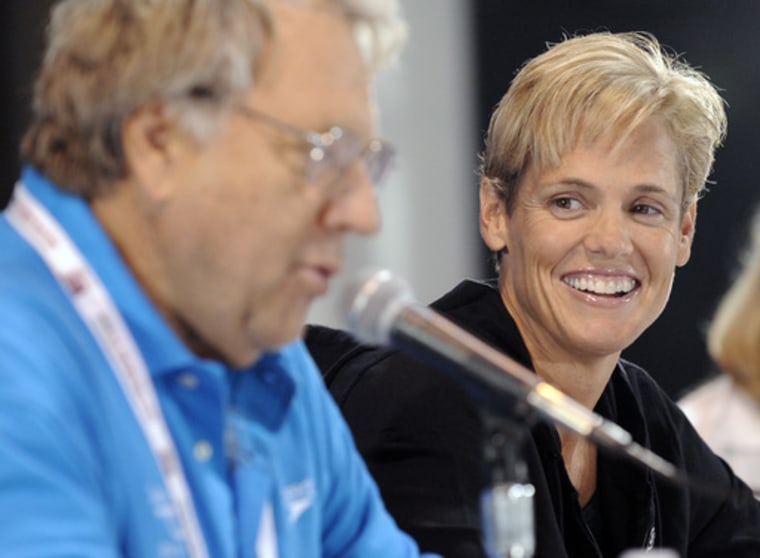This was supposed to be a thrilling time for Dara Torres.
Preparing to swim in her record fifth Olympics at age 41 and with a chance to add to her pile of 10 career medals, she got the shock of her life.
Torres’ coach, Michael Lohberg, was stricken with a rare, potentially fatal blood disorder that has left his star swimmer devastated and prone to crying jags two weeks before the Beijing Games.
“It’s just been an emotional roller coaster. I’m in total shock,” Torres told The Associated Press by phone Friday from the U.S. team’s training camp in Palo Alto, Calif. “I cry a lot and get very emotional.”
Torres found out Tuesday before practice that Lohberg has aplastic anemia, in which the bone marrow doesn’t produce enough new cells, leading to fatigue, increased risk of infection and uncontrolled bleeding. Treatment can involve blood transfusions or a bone marrow transplant.
Lohberg had gone to a South Florida hospital last week believing he was having back surgery to repair a herniated disk, but “the next thing you know, you’re falling apart,” he said by phone Friday from his hospital bed at the National Institutes of Health in Bethesda, Md.
“At the hospital in Florida, they didn’t know what to do anymore because whatever they tried didn’t work,” he told the AP. “Now we’ll see if these people have other methods.”
The 58-year-old coach had been tired in recent weeks, but he assumed it was nothing out of the ordinary. The herniated disk had bothered him during the U.S. Olympic trials this month, when Torres won the 50- and 100-freestyles.
She later dropped the 100 free for Beijing to focus on her specialty, the 50 free, and swim on some relays.
Lohberg, born in Germany, has coached Torres for two years at Coral Springs Swim Club near Fort Lauderdale, Fla.
He is not part of the U.S. coaching staff in Beijing, but Lohberg was going to be there to oversee Torres and the other seven Olympians from five countries that he coaches.
Now, Torres can communicate with him only by phone as he confronts his stunning diagnosis and she makes her historic Olympic trip.
“It was our journey and I feel like I’m missing a part of me while I’m doing this,” she said. “I know he’s with me (in spirit) and the most important thing is he’s getting the best care now. I at least feel more comfortable about that.”
Lohberg flew to Maryland early Friday morning and was undergoing tests.
“We’ll see what comes out of it,” he said in a weak voice. “They’re very good (at treating) that disease.”
Torres is keeping vigil by her cell phone, talking to Lohberg whenever possible. She and the rest of the U.S. swim team were to fly to Singapore later Friday for their final training camp. The swimming competition begins Aug. 9.
“The thing that cheers him up most is knowing how practice is going,” she said.
As Lohberg waited to learn more from doctors, he was focused on Torres’ training schedule and “making sure that she doesn’t lose track.”
Torres’ first thought was to leave camp and fly to Lohberg’s side, joining his wife, Biggi, and the couple’s son and daughter, who baby-sits Torres’ 2-year-old daughter, Tessa.
“He’s adamantly against it,” she said.
The bad news has affected Torres mentally and physically.
“Your body just gets tired and I feel like I’m drained,” she said. “He keeps telling me, ‘You need to stop crying.”’
Torres and Lohberg share an affectionate relationship, which was evident during the trials when they teased and zinged each other at a joint news conference.
Asked what it was like to coach an, ahem, older woman, Lohberg deadpanned that “Dara is a little bit high-maintenance.” She playfully glared at him and punched him in the arm.
In discussing her training, Lohberg said Torres worked out five times a week. “Or is it four?” he needled as Torres rolled her eyes in mock annoyance.
“He doesn’t take any grief from me,” Torres said Friday. “I’ve had some awesome coaches in my past, but he’s probably the only coach who knows how to handle me the best. I feel so thankful and grateful that we ran into each other and met each other. He’s such a good person.”
Lohberg’s health crisis is the latest surprise for the U.S. swimmers, who set nine world records at the trials, but have been hit with bad news since.
It began with breaststroker Eric Shanteau’s announcement that he had been diagnosed with testicular cancer before the trials. He was cleared to compete in the Olympics and will have surgery after the games.
Two days ago came word that Jessica Hardy had tested positive for a banned substance at the trials, jeopardizing her status on the team. She finished second to Torres in the 50 free and won the 100 breaststroke, her specialty event in which she was a medal threat in Beijing.
“It definitely tests you,” Torres said. “You just have to be stronger when you get hit with adversity. This is where the true champion comes out. The timing isn’t always the best. I can sit there and say that and an hour later I’ll be crying.”
Now, Torres’ mind will be half a world away in the days leading to the Olympics. But Lohberg won’t allow his condition to be a distraction.
“She worked too long and too hard for this to interfere,” he said. “That was a goal we had together and she just needs to follow through.”
